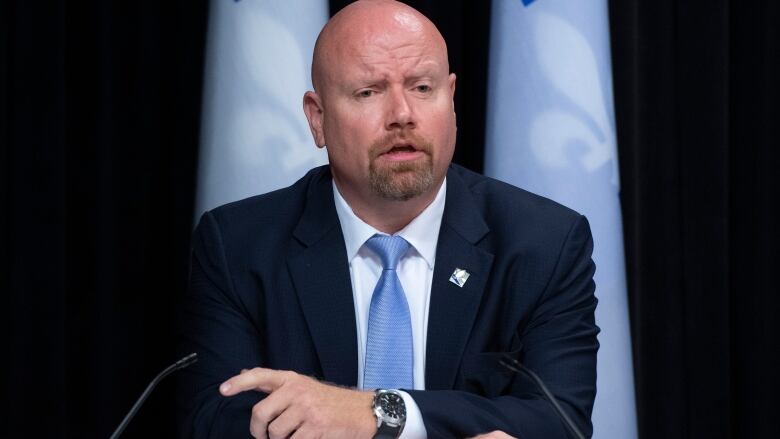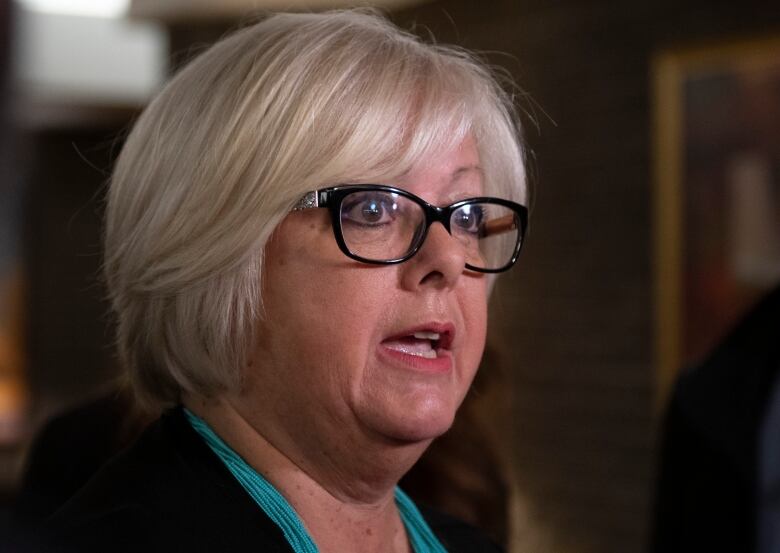Ex-Montreal police inspector takes over as Quebec's Indigenous affairs minister
Ian Lafrenire promises talks with Indigenous leaders, concrete change in wake of death of Joyce Echaquan

Quebec Premier Franois Legault has chosen a former high-ranking Montreal police officer to take over as Indigenous affairs ministerin the wake of the death of an Atikamekw woman last week.
Ian Lafrenire replaces Sylvie D'Amours, who had come under fire for the province's inaction in addressing discrimination facing Indigenous people.
Legault said he chose Lafrenire, in part, because he's a former police officer.
"I think one of the main challenges is to rebuild trust between Indigenous nations and police officers, and who better than a police officer, who understands that problem, to solve it?" he said Friday.
"I'm convinced that Ian will succeed in developing good relations with the Indigenous nations."
Joyce Echaquan, a 37-year-old mother of seven,died last Monday in a Joliette, Que., hospital, after a video captured staff making derogatory remarks about her.
Legault said he will ensure Lafrenire takes concrete and immediate action in response to the final report by the Viens Commission, which was released a year ago.
The report documented the discrimination Indigenous people face when receiving public services. It laid out 142 recommendations, including several to address problems in access to health-care services.
The commission was launched in 2016, following a Radio-Canada investigation into allegations of police misconduct against Indigenous women in Val-d'Or, Que.
The province has so far failed to act on the bulk of the recommendations. D'Amours said earlier this month she had a plan in place to address 51 of them.

Lafrenirepromises swift action
Lafrenire, who was elected in 2018,is the former head of communications at Montreal police, an organization that has had its own problems withracial profiling and discrimination.
A report from three independent researchers released last yearfound systemic bias in street checks done by Montreal police.
According to that report,Indigenous women wereover-represented and 11 times more likely to be stopped by police than white women.
But Lafrenire saidhe is dedicated to working with Indigenous communities and willbegin reaching out to chiefs as soon as possible.
"I'm going to talk to them. This is the first priority," he said.
Lafrenirerefused to give any examples of concrete actions he will take, sayinghe would like to hear from Indigenous communities first.
Chance for new start, First Nations Assembly says
In a release Friday, the Assembly of First Nations Quebec and Labrador said it was pleased with the announcement, as it will allow for new relationships between the Quebec government and Indigenous leaders.
But the assembly saidit will be keeping a close eye on Legault's actions in the coming months.
"There are many issues, including several emergencies, that require his immediate attention. I am
making myself available right now for a meeting," saidGhislain Picard, regional chief for Quebec and Labrador.
Before the official announcement was made, Nakuset,executive director of the Native Women's Shelterof Montreal, said she would havepreferred to see someone who had been advocating for Indigenous rights take on the role, rather than someone who routinely defended the actions of police.
"He was the face of the SPVM," she said, referring to Montreal police. "It's disheartening."
Calls to recognize systemic racism
Echaquan's death hasrenewed calls for Legault's governmentto acknowledge systemic racism exists in the province.
But both Legaultand Lafreniresaid Friday the government's positionremains unchanged.
"I recognize that there is racism and profiling and discrimination. I also recognize that currently the term of systemic racism is not accepted unanimously and instead of fighting over this, I think that what people want is action, concrete action," Lafrenire said.
Constant Awashish, grand chief of the Atikamekw Nation, said thatwhile he believesLafrenirewill be a good fit for the job, acknowledging systemic racism is an important step in gaining people's trust.
"It doesn't [mean] all Quebecers are racist. We've been saying that from the beginning," said Awashish.
An open letter, made public Friday andsigned by more than 470 university professors and health professors, called on Legaultto recognize systemic racism.
WATCH| Joyce Echaquan's husband pleads for justice:
With files from Julia Page and Lauren McCallum













_(720p).jpg)


 OFFICIAL HD MUSIC VIDEO.jpg)
.jpg)



























































































